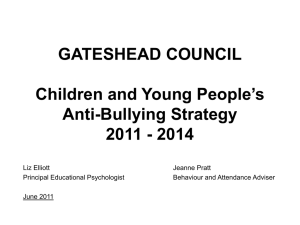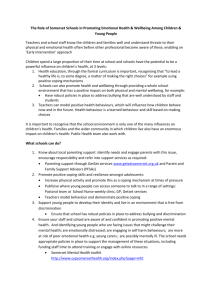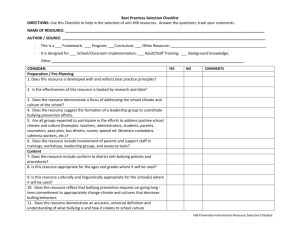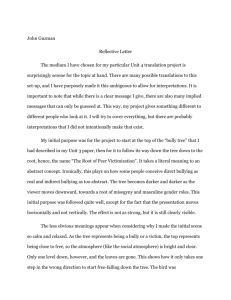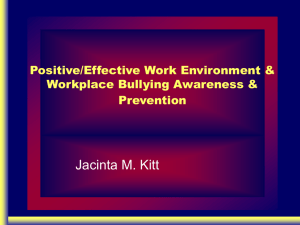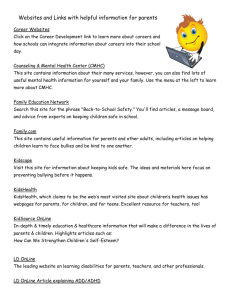Student Welfare - HopeTown School
advertisement
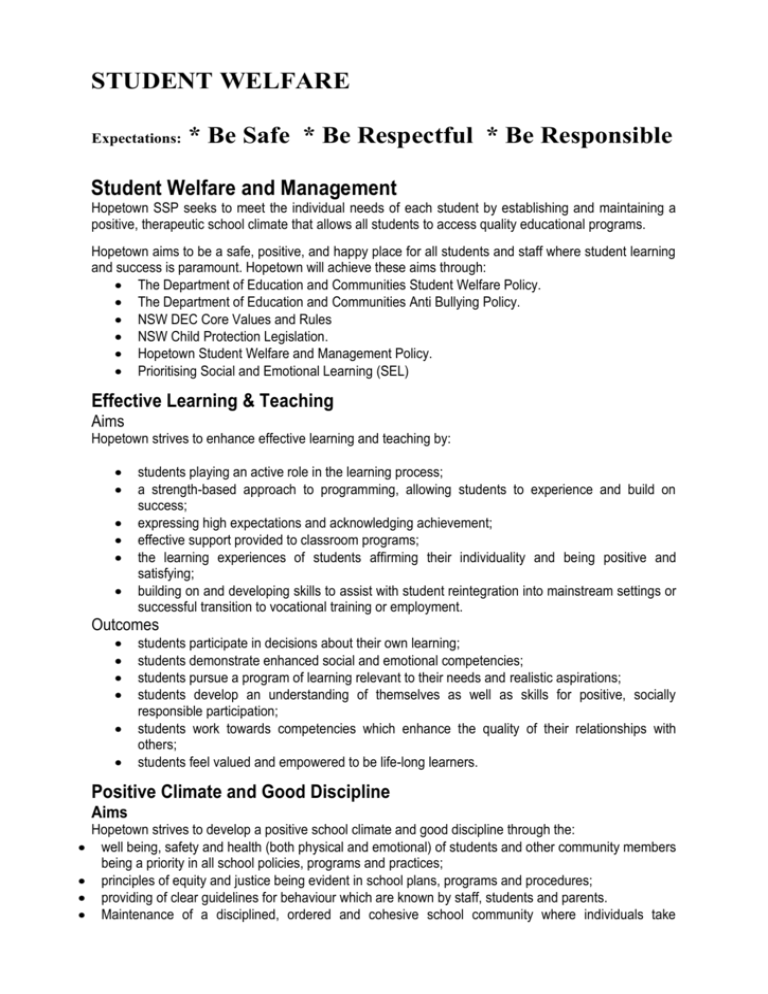
STUDENT WELFARE Expectations: * Be Safe * Be Respectful * Be Responsible Student Welfare and Management Hopetown SSP seeks to meet the individual needs of each student by establishing and maintaining a positive, therapeutic school climate that allows all students to access quality educational programs. Hopetown aims to be a safe, positive, and happy place for all students and staff where student learning and success is paramount. Hopetown will achieve these aims through: The Department of Education and Communities Student Welfare Policy. The Department of Education and Communities Anti Bullying Policy. NSW DEC Core Values and Rules NSW Child Protection Legislation. Hopetown Student Welfare and Management Policy. Prioritising Social and Emotional Learning (SEL) Effective Learning & Teaching Aims Hopetown strives to enhance effective learning and teaching by: students playing an active role in the learning process; a strength-based approach to programming, allowing students to experience and build on success; expressing high expectations and acknowledging achievement; effective support provided to classroom programs; the learning experiences of students affirming their individuality and being positive and satisfying; building on and developing skills to assist with student reintegration into mainstream settings or successful transition to vocational training or employment. Outcomes students participate in decisions about their own learning; students demonstrate enhanced social and emotional competencies; students pursue a program of learning relevant to their needs and realistic aspirations; students develop an understanding of themselves as well as skills for positive, socially responsible participation; students work towards competencies which enhance the quality of their relationships with others; students feel valued and empowered to be life-long learners. Positive Climate and Good Discipline Aims Hopetown strives to develop a positive school climate and good discipline through the: well being, safety and health (both physical and emotional) of students and other community members being a priority in all school policies, programs and practices; principles of equity and justice being evident in school plans, programs and procedures; providing of clear guidelines for behaviour which are known by staff, students and parents. Maintenance of a disciplined, ordered and cohesive school community where individuals take responsibility and work together; Promotion of an inclusive school environment which affirms diversity and respects difference. Outcomes students and staff are safe in the school environment; students know what is expected of them and others in the school community; students are able to learn without disruption from inappropriate behaviour; students are provided with appropriate support programs; students participate in the social, vocational, leisure and academic programs of the school; students value difference and display tolerance; students are respected and supported in all aspects of schooling. Community Participation Aims: Hopetown seeks to enhance community participation by: developing strong links between students, staff, parents/carers and other members of the school community; parents and community members participating in the education of young people and sharing the responsibility for shaping appropriate student behaviour; the curriculum, goals, plans and actions of the school reflecting the needs and aspirations of students and the wider school community; students, parents/carers and teachers perceiving that the priorities of the learning and teaching programs in the school are relevant and beneficial; staff facilitating parent/carer and community involvement in a range of school activities. Outcomes students are supported by parents/carers and community participation in school activities; students value and promote the school as an integral part of the community; students and their families understand how to gain access to relevant support services in the wider community; Students are partners with parents/carers and teachers in the teaching and learning processes in the school. Student Management Code All students at Hopetown SSP have a right to learn in an environment that is safe, therapeutic, positive, encouraging and rewarding. A strong commitment from staff in the belief that all students can learn to make responsible and good choices is paramount to our students’ successes. As a staff we believe that programs developed to meet students physical, psychological, social and educational needs will allow our students to make the transition from school with enhanced skills in these areas, and interact with others in more meaningful and considerate ways. Hopetown’s discipline policy involves a commitment to maintaining conditions for each student’s social, emotional and academic growth. The staff The staff at Hopetown believe that a positive school climate is best supported by a staff who consistently model appropriate behaviours for both student learning and social interactions. Staff are committed to providing quality educational opportunities for all students in supportive, encouraging and motivating environments. The students At Hopetown the individual social, emotional and educational needs of our students are the key priority. Our aim is to provide all students with positive learning opportunities that guide them in accepting an opportunity for positive change. Students are taught, encouraged, and supported in developing their abilities to make responsible and ethical choices. The community ‘Home’ schools, vocational training participants and a range of external agencies are often involved as key stakeholders in Hopetown’s students’ programs and progress. Partnerships When relevant, parents/carers will be involved in the development of Individual Education Plans, Personalised Learning Plans and Individual Transition Plans for students. School reports and other means of feedback will be used throughout the year. The rules, rights and responsibilities: We are SAFE when we: Are friendly Stay out of fights Ask for help when we have a problem Are co-operative Help others Are confident Follow the rules Respect others Are being responsible We show RESPECT when we: We can be RESPONSIBLE when we: Use ‘build ups’ and not ‘put downs’ Are positive Listen to others Are considerate Include others Are confident Look after property Are co-operative Use good manners Are honest Are proud of our school Listen to instructions Follow our contracts Are cooperative Earn our rewards Participate in activities Are considerate Show confidence Are co-operative Let others learn Are honest Try our best Help others Help ourselves to learn Promoting Good Discipline and Effective Learning The staff will: develop individual student plans with outcomes in key learning areas; develop and implement classroom programs that meet the individual learning needs of each student with an emphasis on social / emotional competencies, literacy and numeracy develop individual targets for learning positive behaviours and social skills that are consistently supported by all staff across the school; endeavour to ensure student progress is generalising across environments beyond Hopetown; share knowledge, programs and expertise across the school on a regular basis; evaluate classroom programs and student progress against identified learning outcomes; provide positive role models for students; maintain a positive classroom atmosphere that is supportive, rewarding and encouraging; pursue continued professional learning. The students will: actively participate in classroom programs and decisions about their own learning; follow the school rules. The school community will: be aware of school processes of assessment and reporting of student achievement; be encouraged to participate in school-wide programs to support student learning; support the communication processes in the school e.g. newsletters; communication books; review meetings. Recognising and Reinforcing Student Achievement The staff will: Relate to students in a positive way demonstrating qualities of empathy, genuine positive regard, concreteness, acceptance and tolerance; provide positive role models to students in the way they relate both to students and other adults; provide classroom experiences that focus on individual student success, are highly motivating and emphasise learning; provide a classroom environment that visually reinforces student’s achievements through constantly updated displays of student work; promote the concept that learning is fun, maintaining a positive approach and a genuine and tactful sense of humour; provide each student with clear expectations of behaviour both around the school and in the classroom. School rules are clearly displayed in the school and in the classroom and are consistently and explicitly taught and reinforced; consistently follow the school’s behaviour management programs. The students will: know and state the rules of the school and how to follow the rules; be able to state expectations of behaviour in the school and classroom; establish personal goals and targets in collaboration with their teacher participate in the schools behaviour management program in a fair, honest and non-competitive way. The community will: be aware of and actively support the rules of the school; help develop individual plans for each individual student in consultation with the teacher; regularly participate in reviews of students programs towards goals and achievements of set targets; support the work of the school by consistently reinforcing expectations of behaviour and achievement in the school, in transit, on excursions or outings and in their home school or workplace where relevant. Promoting Positive Behaviour The school focuses on a model of promoting positive behaviour. Staff recognise that students will develop skills to interact more appropriately with peers and adults when provided with opportunities to develop and practice these skills in a positive and therapeutic school environment. Positive behaviour is promoted and encouraged in the school through: strong positive classroom interactions; a focus on recognising positive skills and achievements; an emphasis on modeling and teaching pro-social behaviours. Classroom Behaviour The development of improved social skills and enhanced work habits are a key focus on classroom programs. Classroom teachers design programs to support students learning in these areas that: reflect the philosophies of the school; meet the individual needs of students; reflect the individual philosophies and strengths of teachers. Classroom programs form part of a whole school approach that recognises student achievement for following both school rules and individual goals. Playground Behaviour Students’ behaviour in and around the school is supported using the same philosophies as classroom programs. Students are taught the rules for safe playground behaviour and are rewarded for demonstrating achievement in this area. Transport Behaviour Many students at Hopetown are transported to and from school on a daily basis by Special Transport Services. It is expected that students follow the same rules and expectations whilst in transit. Students are rewarded through school programs for their behaviour on transport. Transport Rules we remain seated at all times; we cooperate with the driver; we leave our seatbelt on; we do not eat or drink in the vehicle; we follow our school rules. Whole School Behaviour Support Helping students to succeed in behaving appropriately can be difficult and challenging. Like all forms of teaching it requires skill, persistence, and knowledge. Successful teachers in this field need to be positive, creative, and perceptive; think ahead, anticipate possible ‘failures’ and to act to avoid these. Encouragement Program Hopetown’s ‘townie’ reward system and a range of home-room based reward programs are integral to promoting student achievement, recognition, self-awareness and self-regulation. Dealing with Unacceptable Behaviour Students are enrolled at Hopetown SSP due to their difficulties in acquiring the skills necessary for socially appropriate behaviour at school. Because of this, Hopetown is committed to a positive approach to managing behaviour of students at school that is focused on teaching students the skills to manage their own behaviour. The focus of programs in the school is on students learning to self-manage behaviour within a school and classroom context to enable successful participation in the future years of schooling and as a successful member of the wider community. Hopetown has developed a range of strategies in dealing with unacceptable behaviour that operate on ‘least to most’ principles. DET’s Suspension and Expulsion of School Students procedures ( http://www.det.nsw.edu.au/policies/index.shtm )still apply at Hopetown but with an emphasis on factors such as the individual needs, disabilities and developmental levels of students. Individual Planning and Functional Assessment The emphasis at Hopetown is always on preventative and proactive strategies to enable students to experience the use of positive socially acceptable solutions to behaviour problems. A component of each student’s behaviour support is a process for dealing with problem behaviour when it occurs. Students with extremely violent and challenging behaviour should also have a crisis management plan detailing the process to be followed in extreme and unsafe behavioural episodes. Classroom Approaches Most behaviour is generally dealt with by classroom teachers within the classroom. Teachers use a range of strategies to support students’ behaviour. Classroom teachers are expected to detail process for each student in dealing with unacceptable behaviour: Time Out / Loss of privilege Following the range of strategies designed to teach and support students to develop improved behaviours, teachers may use time away from positive reinforcement or loss of privilege. Students may lose access to the range of school rewards for inability to follow school and classroom rules. Time out from classroom activities when students are extremely disruptive may be used. Time out should be supervised by an adult at all times. It is generally understood that ‘time-out’ involves a loss of privileges. Students cannot earn access to privileges when they are not engaged in classroom activities. Referral to Principal Students can be referred to the principal when classroom and ‘time-out’ strategies have been unsuccessful. Teachers should generally indicate to the principal the nature of the problem behavior and the desired outcome. A range of consequences may result from a referral to the principal. It is generally understood that time with the school principal involves a loss of some privileges. Phone contact with parents/carers Parents/carers are considered equal partners in student’s educational and behavioural programs. The principal and staff may make contact with parents/carers through the course of the school day to discuss a student’s behaviour, clarify any home circumstances that may contribute to the behaviour and discuss possible solutions. In-school consequences In-school organised consequences results from persistent failure to follow school rules and/or extreme acts of violence or property destruction. “In-school” consequences is often used as an alternative to suspension as it is generally understood by the school that students have the best chance of developing appropriate skills within the school context. It also recognises that for some student’s time at home may be counter-productive to the school aims and programs. HOPETOWN SCHOOL ANTI-BULLYING POLICY Hopetown School promotes a therapeutic school culture in which quality learning and the development of Emotional Literacy can occur. Bullying undermines such a culture. Hopetown School actively discourages, mitigates against and responds to incidents of bullying. Bullying: devalues, isolates and frightens affects an individual's ability to achieve and has long-term effects on those engaging in bullying behaviour, those who are the subjects of bullying behaviour , onlookers or bystanders and school staff. Definition: Bullying can be defined as intentional, repeated behaviour by an individual or group of individuals that causes distress, hurt or undue pressure. Bullying involves the abuse of power in relationships. Bullying can involve all forms of harassment (including sex, race, disability, homosexuality or transgender), humiliation, domination and intimidation of others. Bullying behaviour can be verbal eg name calling, teasing, abuse, putdowns, sarcasm, insults, threats physical eg hitting, punching, kicking, scratching, tripping, spitting social eg ignoring, excluding, ostracising, alienating, making inappropriate gestures psychological eg spreading rumours, dirty looks, hiding or damaging possessions, malicious SMS and email messages, inappropriate use of camera phones. Statement of Purpose Students attend Hopetown to participate in quality education that will help them to become self directed, lifelong learners who can create a positive future for themselves and the wider community. Any inappropriate behaviour that gets in the way of teaching and learning at Hopetown and interferes with the wellbeing of students cannot be accepted. Students, teachers, parents, caregivers and members of the wider school community have a shared responsibility to create a safe and happy environment, free from all forms of bullying. Bearing in mind the social and emotional difficulties experienced by students at Hopetown; students, teachers, parents, caregivers and members of the wider school community can expect the school’s earnest endeavours to keep students safe at school, free from fear of bullying, harassment and intimidation to be involved in the collaborative development of the school Anti-bullying Plan to know what is expected of them and others in relation to the Anti-bullying Plan that all students will be provided with appropriate support when bullying occurs. Students, teachers, parents, caregivers and members of the wider school community have a responsibility to promote positive relationships that respect and accept individual differences and diversity within the whole school community contribute to the development of the Anti-bullying Plan and support it through words and actions actively work together to resolve incidents of bullying behaviour when they occur. Students can expect to know that their concerns will be responded to by school staff be provided with appropriate support (for both the targets and perpetrators of bullying) take part in learning experiences that address key understandings and skills relating to self-awareness, self-control, social skills, empathy, motivation, positive relationships, safety, gender equity, discrimination, bullying and harassment. These experiences will be guided by the Personal Development, Health and Physical Education syllabuses, other Key Learning Areas and dedicated Emotional Literacy programs. Students have a responsibility to behave appropriately, respecting individual differences and diversity follow the school Anti-bullying Plan respond to incidents of bullying according to their school Anti-bullying Plan. Parents and caregivers have a responsibility to support their children in all aspects of their learning be aware of the school Anti-bullying Plan and assist their children in understanding bullying behaviour support their children in developing positive responses to incidents of bullying consistent with the school Anti-bullying Plan support all students of the school to deal effectively with bullying through the strategies of the Anti-bullying Plan. Hopetown School has a responsibility to inform students, parents, caregivers and the community about the School Discipline Code and Anti-bullying Plan provide students with strategies to respond positively to incidents of bullying behaviour, including responsibilities as bystanders or observers provide parents, caregivers and students with clear information on strategies that promote appropriate behaviour, and the consequences for inappropriate behaviour communicate to parents and caregivers that they have an important role to play in resolving incidents of bullying behaviour involving their children follow up complaints of bullying, harassment and intimidation. Teachers have a responsibility to respect and support students in all aspects of their learning model appropriate behaviour respond in an appropriate and timely manner to incidents of bullying according to the school Anti-bullying Plan. HOPETOWN SCHOOL ANTI-BULLYING PLAN The school community will be provided information on the following through staff development training, classroom lessons and newsletters. Identifying bullying behaviours: Bullying behaviour can be verbal eg name calling, teasing, abuse, putdowns, sarcasm, insults, threats physical eg hitting, punching, kicking, scratching, tripping, spitting social eg ignoring, excluding, ostracising, alienating, making inappropriate gestures psychological eg spreading rumours, dirty looks, hiding or damaging possessions, malicious SMS and email messages, inappropriate use of camera phones. Warning signs that a child is being bullied at school: (Note: many of these indicators are already characteristic of students at Hopetown for reasons other than bullying.) Physical Unexplained bruises Torn or damaged clothes or belongings Psychosomatic Non-specific pains, headaches, abdominal pains Behavioural Fear of attending school Deterioration in school work Hungry (lunch or money taken) ‘Loss’ of possessions or money Asking for or stealing money to pay the bully Having few friends Rarely invited to parties Favouring violence towards others May enjoy seeing others get hurt Distrustful or fearful Behaviour Changes Become withdrawn Stammer Unexpected mood change Irritability and temper outbursts Appear upset, unhappy, tearful, distressed Stop eating Suicide ideation or attempts Appear anxious: wet bed, bite nails, motor tics, poor sleep, Nightmares Poor concentration Refuse to say what is wrong Improbable excuses for any of the above Hopetown school will periodically collect and analyse appropriate data on the nature and extent of bullying in school. What information is needed? Extent of bullying Types of bullying Frequency and severity Location of bullying Who is involved and why How will information be gathered? Surveys of students – Quality of School Life questionnaires Student Quiz (K. Rigby 2003) Bystander Exercise (K. Rigby 2003) Survey of staff Handling Bullying: a staff questionnaire (K. Rigby ) Anonymous reporting encouraged by school staff Playground supervision, staff observations ‘Hot Spot’ mapping of the school – conducted by AP Record keeping (SENTRAL) Parent feedback Check policies and professional sources STRATEGIES: 1) Hopetown’s Anti-Bullying Plan is an integral component of the school’s Emotional Literacy Program. The development in students of Emotional Literacy competencies in selfawareness, self-regulation, empathy, motivation and social skills should directly reduce the acceptance and likelihood of a bullying culture in school. Exercises in co-operative learning, resilience training, ‘Rock and Water’ and social skills training all contribute to the same positive outcomes. 2) Playground bullying is reduced through: Staff identification of ‘hot spots’ Deployment of multiple supervisory staff Reduced lunch break to 30 minutes Provision of diversified activities eg. quiet room, computer time, field games Provision of a separate, supervised recreation area for vulnerable, internalising and anxious students 3) Students, parent/carers and staff are actively encouraged to notify the principal or executive of any concerns or evidence related to bullying in schools. 4) All staff, students and parents/carers are made aware of Hopetown School’s Welfare and Discipline Policy. 5) Hopetown has a clearly defined and promoted policy regarding the negative effects of bystanders in bullying and crisis situations. There are disciplinary consequences for recalcitrant bystanders. 6) Every staff meeting agenda includes bullying as an item for weekly monitoring and review. 7) Reported instances of bullying are directed to an Assistant Principal or the Principal for prompt investigation and response. 8) Each proven case of bullying is dealt with in consideration of the specifics of that case. Of primary consideration is the nature and degree of disability of the students involved. This will determine which of the following methods of response will be employed. For moderate degrees of bullying: The No-Blame Approach. (Maines and Robinson, 1992) (ref: http://www.molecreek.tased.edu.au/BullyingNoBlameApproach.htm ) This requires group of children including the victim and supposed bullies to be convened. Normally there would be a number of influential pro-social children involved. The plight of the victim is described and the group left to come up with and implement an agreed and responsible solution. The outcome is then carefully monitored by staff. The Method of Shared Concern. (Pikas, 1989) (ref: http://www.education.unisa.edu.au/bullying/concern.html) The bully is seen individually. This requires the counsellor/staff to expresses his/her concern for the victim and invites the bully to take responsible action to remedy the situation. Group work with the bully and victim follows to effect true reconciliation and to elicit from the bully a promise to act in a specified and positive wary in future interactions with the victim. This is done in a non-threatening manner along lines suggested by Professor Anatol Pikas. For very severe bullying: School Conferencing (A Restorative Justice Approach). (ref: http://www.aic.gov.au/publications/tandi/tandi219.html) Bullies and victims are brought together at a meeting which their parents/carers and friends may also attend. Victims are strongly supported in expressing their objection to how they have been treated. The bully is induced to feel a sense of shame and is expected to make appropriate reparations before a reconciliation can be effected. Sanctions may be applied, including suspension of the perpetrators. In extreme cases there may be police involvement. (ref: Hopetown School’s Welfare and Discipline Policy, DET’s Suspension and Expulsion of School Students Procedures) Sanctions must be within Hopetown’s behaviour management guidelines and be followed up with behaviour change strategies e.g. Life Space Interview. Resources: Anti-bullying Plan for Schools (2005) https://detwww.det.nsw.edu.au/policies/student_serv/discipline/anti_bully/PD20040050_i.sht ml Taking Action Keeping Safe (2005) MindMatters Checklist of strategies to reduce bullying and harassment http://cms.curriculum.edu.au/mindmatters/resources/pdf/booklets/deal_bully_intro.pdf Stop the Bullying: A Handbook for Schools. K. Rigby (2003) Anti-bullying programs in NSW schools https://www.det.nsw.edu.au/antibullying/ http://www.bullyingnoway.com.au The playground: Best practices in primary schools (1999) Principles for managing school bullying (2002) and Bullying and Victimisation in Schools: A Restorative Justice Approach (2002) http://www.aic.gov.au/publications/tandi/tandi219.html Addressing Bullying in Schools: Theory and Practice K. Rigby (2003) http://www.aic.gov.au/publications/tandi2/tandi259.html Information for schools on homophobic bullying. Anti-bullying Network Scotland http://www.antibullying.net/homophobic2.htm Psychosocial aspects of mobile phone use among adolescents (2004) http://www.psychology.org.au/news/psychology_week/10.10_2.asp#peer Strategies for Safer Schools – Phase 2 Elective 3 (DET publication) Managing Conflict With Confidence. C. Heaton & M. Lynch (2003) Working with Aggressive Youth. Boys Town Press (1995)

